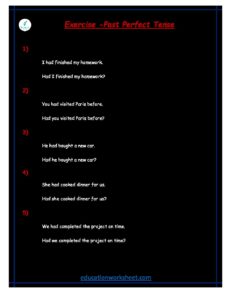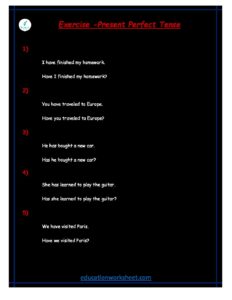changing Past Perfect Tense to positive and interrogative worksheets
changing Past Perfect Tense to positive and interrogative
The Past Perfect tense is a grammatical construction used to indicate an action or event that was completed before another action or event in the past. It is formed by using the auxiliary verb “had” followed by the past participle of the main verb. In this discussion, we will explore how to change sentences in the Past Perfect tense from their affirmative (positive) form to the interrogative (question) form. This transformation involves altering the word order and adding question words or question tags. In English grammar, questions can be broadly categorized as yes-no questions and information questions, and we will address both types.
Changing Positive to Interrogative (Yes-No Questions):

Affirmative: She had finished her homework. Interrogative: Had she finished her homework?
In the above example, the affirmative sentence “She had finished her homework” is transformed into an interrogative sentence by placing the auxiliary verb “had” at the beginning of the sentence.
Another example: Affirmative: They had already left. Interrogative: Had they already left?
Changing Positive to Interrogative (Information Questions):

Affirmative: He had studied French for two years. Interrogative: How long had he studied French?
In this transformation, you need to identify the relevant information you want to inquire about and frame it into a question.
Another example: Affirmative: Sarah had visited Paris. Interrogative: Where had Sarah visited?
Using Question Words in Information Questions:
Affirmative: They had cooked a delicious meal. Interrogative: What had they cooked?
Here, the question word “what” is used to inquire about the object of the action.
Another example: Affirmative: James had worked for that company. Interrogative: Which company had James worked for?
Changing Positive to Interrogative with Question Tags:
Affirmative: We had arrived early, hadn’t we?
In this form, a positive sentence is followed by a question tag, which is a short question at the end of the statement. The question tag is usually the auxiliary verb of the sentence, in the negative form.
Another example: Affirmative: You had seen that movie before, hadn’t you?
Changing Positive to Interrogative with Wh- Question Words:
Affirmative: She had visited her grandparents on the weekend. Interrogative: When had she visited her grandparents?
Here, the question word “when” is used to ask about the specific time of the action.
Another example: Affirmative: They had completed their project. Interrogative: Why had they completed their project?
Changing Positive to Interrogative with Tag Questions:

Affirmative: He had finished his report on time, right?
In this transformation, a positive statement is followed by a tag question that seeks confirmation.
Another example: Affirmative: She had met him before, didn’t she?
In conclusion, changing sentences from the Past Perfect tense to the interrogative form involves adjusting word order, using question words or tags, and, in the case of information questions, specifying the information you want to inquire about. These transformations are essential for effective communication and understanding in English grammar.

